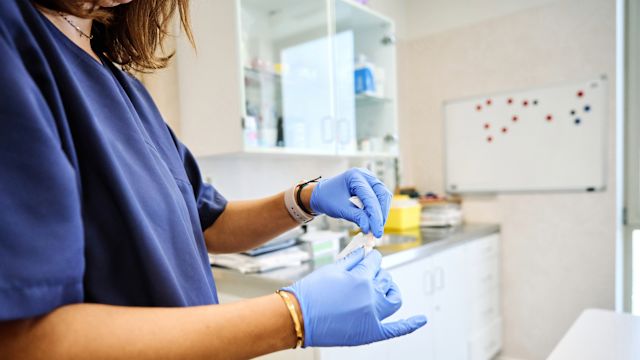Updated on May 15, 2025
Immunotherapy is a category of cancer treatment that helps the body's immune system identify and attack cancer cells. It's one of several treatment options that may be used in the treatment of renal cell carcinoma (RCC). RCC is the most common form of cancer that begins in the kidneys, and accounts for approximately 90 percent of all kidney cancers.
How does immunotherapy work to treat RCC?
There are multiple types of cancer immunotherapies. The main type of immunotherapy used in the treatment of RCC are drugs called immune checkpoint inhibitors.
An immune checkpoint is a protein found on the surface of cells throughout the body. These proteins are what prevent the immune system from attacking healthy cells—in other words, they help keep the immune system in check. Cancer cells can have immune checkpoints, which helps cancer avoid being attacked by the immune system. This allows cancer cells to continue to grow, divide, and spread.
Immune checkpoint inhibitors disable (or inhibit) immune checkpoints. This enables the immune system to recognize cancer cells for what they are—abnormal cells that need to be eliminated.
What immune checkpoints are targeted?
Different immune checkpoint inhibitors act on different immune checkpoints. The immune checkpoints that are targeted in the treatment of RCC include:
- PD-1 (programmed death receptor-1)
- PD-L1 (programmed death-ligand 1)
- CTLA-4 (cytotoxic T-lymphocyte-associated protein 4)
A healthcare team may order tests to look at genetic and molecular characteristics of a tumor (called biomarkers). This can help predict how the cancer will respond to immunotherapy, and what type of immunotherapy it may respond to.
What about other types of immunotherapy?
Another concept that's helpful to understand is cytokines. Cytokines are proteins that help regulate the activity of the immune system. Infusions of lab-made cytokine called interleukin-2 (IL-2) are used as a treatment for RCC. These infusions increase immune system activity and help the immune system attack cancer cells. This treatment option is used less often than immune checkpoint inhibitors, but it is still used in certain cases.
How is immunotherapy administered?
Most immunotherapy drugs are administered with an intravenous infusion, where a needle is inserted into a vein. This is typically done at an infusion center or a hospital. How often infusions are given and the number of infusions will vary from person to person. While infusion schedules vary depending on the specific drug being used, infusions are typically given every 2 to 6 weeks.
For certain immunotherapy medications, subcutaneous injections may be a treatment option. A subcutaneous injection involves a needle inserted into the layer of tissue immediately underneath the skin, called the subcutaneous layer. This is typically in the abdomen or thigh, though specific drugs can only be injected at specific sites.
Subcutaneous injections take much less time than an intravenous infusion and can also be administered at a healthcare provider's office (instead of an infusion center or hospital). Subcutaneous immunotherapy drugs work the same as their intravenous counterparts, the only difference is the route of administration.
Subcutaneously administered cancer treatments are a topic of interest to medical researchers because they have the potential to make treatments like immunotherapy more accessible to more people.
In addition to infusions, a person treating RCC with immunotherapy will need regular checkups to monitor their response to treatment. Checkups are also important for identifying any side effects from treatment, which can include fatigue, skin rashes, joint and muscle pain, and GI symptoms. Your healthcare team can advise you on strategies that can help ease and manage side effects.
What else should you know?
It's important to remember that there is no best treatment for RCC, only the treatment that is best for a particular person at a particular time. Treatment for RCC will depend on the stage of the cancer, the overall health of the person being treated, and tumor biomarkers.
Surgery, radiation therapy, and other anti-cancer drugs (like chemotherapy and targeted therapy) all have a place in treatment. Immunotherapy is most often used in the advanced stages of RCC, where the tumor cannot be removed by surgery or has spread to other parts of the body. It may also be used after surgery, to help eliminate any cancer cells that remain in the body.
If you have questions about a diagnosis of RCC, immunotherapy, or other treatment options, your best source of information will be a healthcare team.



